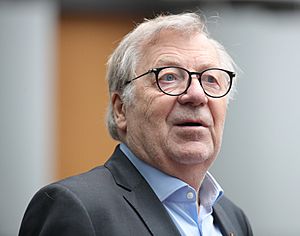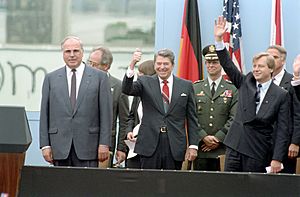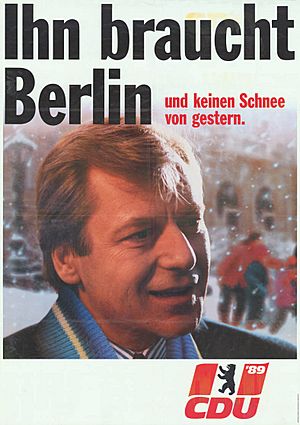Eberhard Diepgen facts for kids
Quick facts for kids
Eberhard Diepgen
|
|||||||||||||||||||||||||
|---|---|---|---|---|---|---|---|---|---|---|---|---|---|---|---|---|---|---|---|---|---|---|---|---|---|

Diepgen in 2023
|
|||||||||||||||||||||||||
| Governing Mayor of Berlin | |||||||||||||||||||||||||
| In office 24 January 1991 – 16 June 2001 |
|||||||||||||||||||||||||
| Mayor |
|
||||||||||||||||||||||||
| Preceded by | Walter Momper (West Berlin) Tino Schwierzina (East Berlin) |
||||||||||||||||||||||||
| Succeeded by | Klaus Wowereit | ||||||||||||||||||||||||
| In office 9 February 1984 – 16 March 1989 |
|||||||||||||||||||||||||
| Mayor |
|
||||||||||||||||||||||||
| Preceded by | Richard von Weizsäcker | ||||||||||||||||||||||||
| Succeeded by | Walter Momper | ||||||||||||||||||||||||
|
|||||||||||||||||||||||||
| Personal details | |||||||||||||||||||||||||
| Born | 13 November 1941 Wedding, Berlin, Nazi Germany (now Germany) |
||||||||||||||||||||||||
| Political party | Christian Democratic Union (1963–) | ||||||||||||||||||||||||
| Residence | Berlin | ||||||||||||||||||||||||
| Alma mater | Free University of Berlin | ||||||||||||||||||||||||
Eberhard Diepgen (born 13 November 1941) is a German lawyer and politician. He was the Mayor of West Berlin from 1984 to 1989. Later, he became the Mayor of the united city of Berlin from 1991 to 2001. He is a member of the Christian Democratic Union (CDU) political party.
Contents
Early Life and Education
Eberhard Diepgen was born in Berlin on 13 November 1941. He was the first person born in Berlin to become its governing mayor. After finishing high school in 1960, Diepgen studied law at the Free University of Berlin.
Joining Politics
While studying, he became interested in politics. In 1962, he joined the Christian Democratic Union (CDU). He was also active in a student group called the "Ring of Christian Democratic Students." In 1963, he briefly led the "General Student Committee" at his university. After finishing his law studies in 1967, Diepgen became a lawyer in 1972.
Political Journey
Berlin Parliament Member
Diepgen focused on education policy within the Berlin CDU party. In 1971, he became a member of the party's state board. In the same year, he joined the Abgeordnetenhaus of Berlin, which is Berlin's state parliament. By December 1980, he became the leader of the CDU group in the parliament. He played an important role in supporting the city's government during this time.
Mayor of Berlin
Leading West Berlin

In February 1984, Eberhard Diepgen was elected as the new Mayor of West Berlin. He took over from Richard von Weizsäcker, who became the President of West Germany. Under Diepgen's leadership, the CDU party won the state elections in 1985.
During his time as mayor, Diepgen visited Washington, D.C. He met with important leaders like President Ronald Reagan. His term also included big celebrations for Berlin's 750th anniversary. Famous guests like Queen Elizabeth II and US President Ronald Reagan visited Berlin for these events.
In late 1988, Diepgen called for an early state election. He hoped to win again based on his popularity. However, in the election on 29 January 1989, his party lost its majority. The CDU was still the strongest party, but they could not form a government. Walter Momper from the SPD party then formed a new government. Diepgen became the leader of the opposition.
Leading United Berlin
After Germany reunited in October 1990, East and West Berlin became one city again. The first election for the united Berlin took place on 2 December 1990. The CDU party won the most votes. Diepgen then formed a government with the SPD party. On 24 January 1991, the Berlin parliament elected Diepgen as the Mayor of the united Berlin.
Diepgen quickly moved the mayor's office to Berlin's historic town hall in the Mitte district. During his second term, the German parliament (Bundestag) and most government offices also moved to Berlin. In 1991, Diepgen ordered the removal of a large statue of Lenin. He wanted to remove symbols of the past dictatorship.
In May 1996, Diepgen worked with other leaders to choose Schönefeld as the location for the new Berlin Brandenburg Airport. This decision was later approved by the state parliaments. In 1996, Diepgen also supported a plan to unite Berlin and the state of Brandenburg. However, this plan was not approved by voters.
In 1999, there was a disagreement between Diepgen and the U.S. government. They disagreed about how much security space the new American embassy in Berlin needed. This caused delays in building the embassy.
In June 2001, the Social Democrats left Diepgen's government. They accused him of poor management. Diepgen then resigned, and Klaus Wowereit became the acting mayor. Before the 2002 national elections, Diepgen also resigned as the head of the CDU party in Berlin.
Life After Politics
After leaving his role as mayor in 2001, Eberhard Diepgen joined a law firm in Berlin. He has also held several other positions, both paid and unpaid. These include being a member of the board for the Zoological Gardens of Berlin since 2010. He also served as a delegate for electing the President of Germany in 2017 and 2022.
Awards and Honors
Eberhard Diepgen has received several important awards:
- Grand Cross of the Order of Merit of the Federal Republic of Germany (1999)
- Honorary Knight Commander of the Order of the British Empire (1994)
See also
 In Spanish: Eberhard Diepgen para niños
In Spanish: Eberhard Diepgen para niños
 | Charles R. Drew |
 | Benjamin Banneker |
 | Jane C. Wright |
 | Roger Arliner Young |


